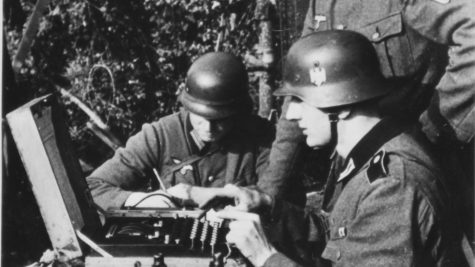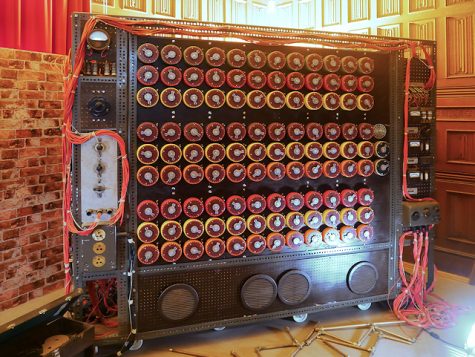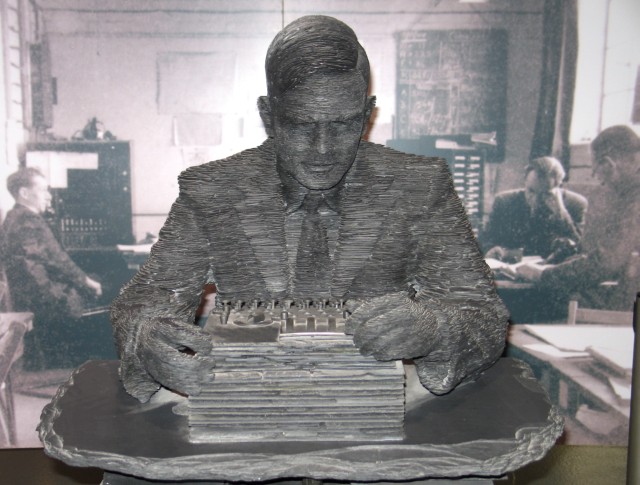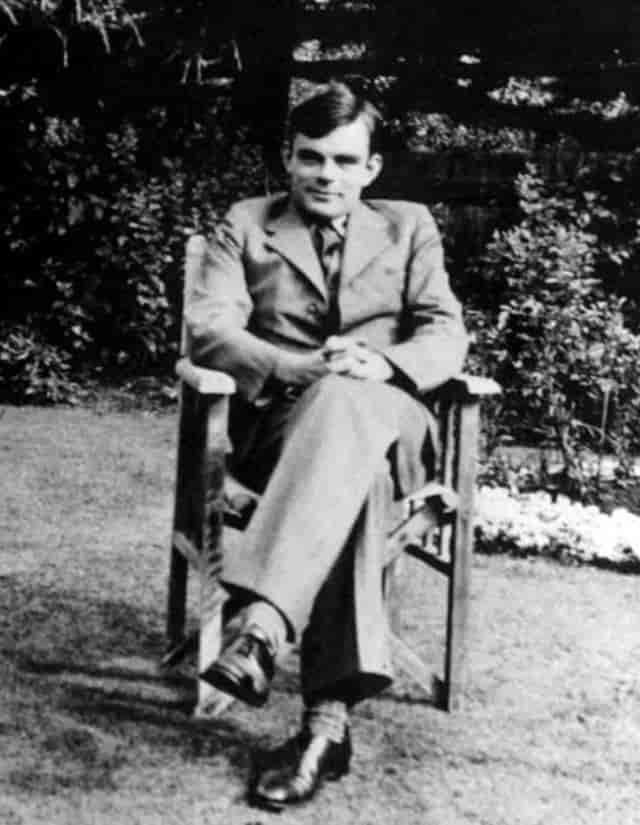“But He Is A Gay Man”
The Life and Legacy of Alan Turing, Father of Modern Computer Science
May 11, 2022
Alan Turing was a mathematical genius who is known for solving the Enigma Code during World War II, which is estimated to have saved anywhere from 14 to 21 million lives. He is known as the “Father of Modern Computer Science” and created things that eventually led to the first functional computer. Despite all his accomplishments, many don’t know about this inspiring man. This leaves one to wonder why Turing is left out of mainstream history.
The Decoder
Alan Mathison Turing was born in London on June 23, 1912. Growing up, Turing attended Hazelhurst Preparatory School and later, Sherborne School. While many consider Turing to be a genius, he struggled with traditional schooling. He was more interested in coming up with his own solutions than following the school’s curriculum. Despite this, Turing read a lot of work published by another genius, Albert Einstein, which eventually led to him forming his own theories. Turing’s headmaster, who was annoyed by Turing’s dismissive attitude toward school, once wrote, “If he is to stay at Public School, he must aim at becoming educated. If he is to be solely a Scientific Specialist, he is wasting his time at a Public School.” Still, Turing aspired to go to college.
Turing attended the University of Cambridge from 1931 to 1934, where he wrote a number of papers that have made significant contributions to the development of computer science. These papers also eventually helped to create the Turing machine, a machine that put together the idea of a modern computer before advancements in computer hardware had reached the point where physical construction of such a machine was even possible. The thought was that the machine could simulate any computer algorithm or task – memorizing, copying, and performing every math equation at unimaginable speeds.

When war was declared in 1939, Turing moved to work full-time at the Government Code and Cypher School at Bletchley Park. Turing’s ideas for solving codes and developing computers to assist in breaking such codes may have saved more civilian lives in the course of the war than any other military personnel.
With another mathematician, W. G. Welchman, Turing developed the Bombe, a machine based on earlier work by Polish mathematicians. In 1940, the Bombe was decoding all messages sent by the Enigma machines. From late 1942 until early 1943, Turing was in the United States helping decode more ways the Germans were encoding their messages. In 1954, for his vital contribution to the war effort, Turing was awarded the Most Excellent Order of the British Empire. This is a British order of chivalry, rewarding contributions to the arts and sciences, work with charitable and welfare organizations, and public service outside the civil service.
At the end of the war, Turing was invited by the National Physical Laboratory in London to design a computer, which he called the Automatic Computing Engine (ACE). His idea was an original detailed design for what we consider to be a modern computer. Unfortunately, the size of storage he planned for the computer was regarded as hopelessly ambitious, and there were delays in the project being approved since technology at the time wasn’t as advanced as Turing’s vision. His plans were overshadowed by the more powerfully supported American projects and never came to fruition while Turing was alive. Frustrated and determined to continue with his own work, Turing returned to Cambridge where his interests ranged over many topics, including neurology and physiology. During this time he wrote code for programming computers separately from the National Physical Lab.
‘Yours In Distress’
Turing strongly believed that machines could be intelligent. He saw computers as a way of “building a brain” and codes as puzzles. In a 1950 article published in the academic journal Mind, Turing developed the “Turing Test,” an experiment to determine whether a computer could pass as a human. A human interrogator would ask questions and try to figure out whether the answers had come from a computer or a human. Today, despite major advances in artificial intelligence, no computer has ever passed the Turing test. However, a few humans have been known to fail the test as well. Truly, Turing was ahead of his time.

Turing was known to say, “If a machine is expected to be infallible, it cannot also be intelligent.” Although humanity as a whole displays intelligence, society at the time made a huge mistake in disregarding Turing’s dedication and courage towards being himself. The beginning of the end was when Turing was arrested for violation of Britain’s homosexuality statutes in 1952. He had gone to the police because he had been robbed and when the detectives questioned about his relationship with a man named Arnold Murray, Turing replied honestly. He was put on trial in March of 1952, offering no defense other than he saw nothing wrong in his actions. Found guilty, he was given the choice between prison or estrogen injections for a year. Turing chose the latter and was ordered to undergo chemical castration.
Before the treatments started, Turing wrote to his dear friend and fellow mathematician, Norman Routledge. In this letter, he famously fears not about his own health, but that his contributions to computer sciences will be dismissed because of his sexuality. His letter is devastatingly simple and honest, reflecting the discriminatory nature of his time. Here is a man who has been credited for saving lives during a world war, and making outstanding advances in computer science; but he is a gay man, and so these accomplishments mean nothing in terms of his fate. Although Turing initially approaches the subject with humor, it quickly dissolves into devastation:
I’m afraid that the following syllogism may be used by some in the future:
Turing believes machines think
Turing lies with men
Therefore machines do not think
Yours in distress,
Alan
Despite a horrific punishment, Alan refused to let the treatment sway him from his work, keeping up his lively spirit. Using humor as his coping mechanism, he fought back, insisting on working as if nothing had happened. He continued doing things he loved. He openly talked about the trial, mocking the law’s absurdity. In defiance of the law, he traveled abroad to Norway and the Mediterranean, where gay rights movements were flourishing. Since homosexuality was considered a security risk at the time due to misconceived notions of its contagiousness and classification as a disease, Turing was restricted from leaving the country shortly after his trip.
When the Cold War began, Alan was not allowed to continue with his life-saving contributions in computer science. He was not trusted after he had been revealed as gay in 1952. A stronger willed man than most, Alan could handle the horrific punishments of hormonal injections and being confined to his country; but when the genius was told he could not continue his life’s work, he likely took this as the final harsh blow that it was. Many suspect that Alan’s apparent suicide was propelled by the government’s severe response to his guilty plea of homosexuality.
While a common warning sign of an impending suicide is sudden calmness and acceptance, Turing’s final days were as cheerful as ever. He continued some of his work from home and showed no indication that anything was wrong. Turing died on June 7, 1954, at age 41 by eating a cyanide-laced apple in his own home. While a coroner deemed the death a suicide, the apple at Turing’s side was never forensically examined. Although it can not be determined for sure, many believe it was a purposeful act on Turing’s part. Not too many people really cared about his death outside of his family, and the value of his work went unrealized for decades.
The “Turings” of the World
In 2014, Turing was officially pardoned for the “crime” of homosexuality by the Queen of England. As of 2016, in what is informally called the “Alan Turing Law”, others convicted of breaking historical laws against homosexual acts have been pardoned in England and Wales.
Today, Turing’s contributions have revolutionized the way our computers run–yet Turing himself is rarely discussed. Like many other notable heroes throughout history, Turing was never motivated by fame or fortune. His innovative thinking and visionary acclaim were s driven by a desire to bring about fundamental changes in technology that would have a positive impact on future generations. Still, despite Turing’s impact, mainstream history deems queer brilliance unfit to discuss. Mainstream history picks and chooses the convenient portions of LGBTQ+ stories while leaving out the abuse such historical figures suffered. We owe it to ourselves, to Turing, and the world to recognize the historical impacts that such people have had on society.
History may not remember Alan Turing the way it should; but, by holding society accountable for the abuse queer individuals have suffered while simultaneously profiting off of their accomplishments and contributions, our collective memory of Turing–and all the Turings of the world–can be restored.

